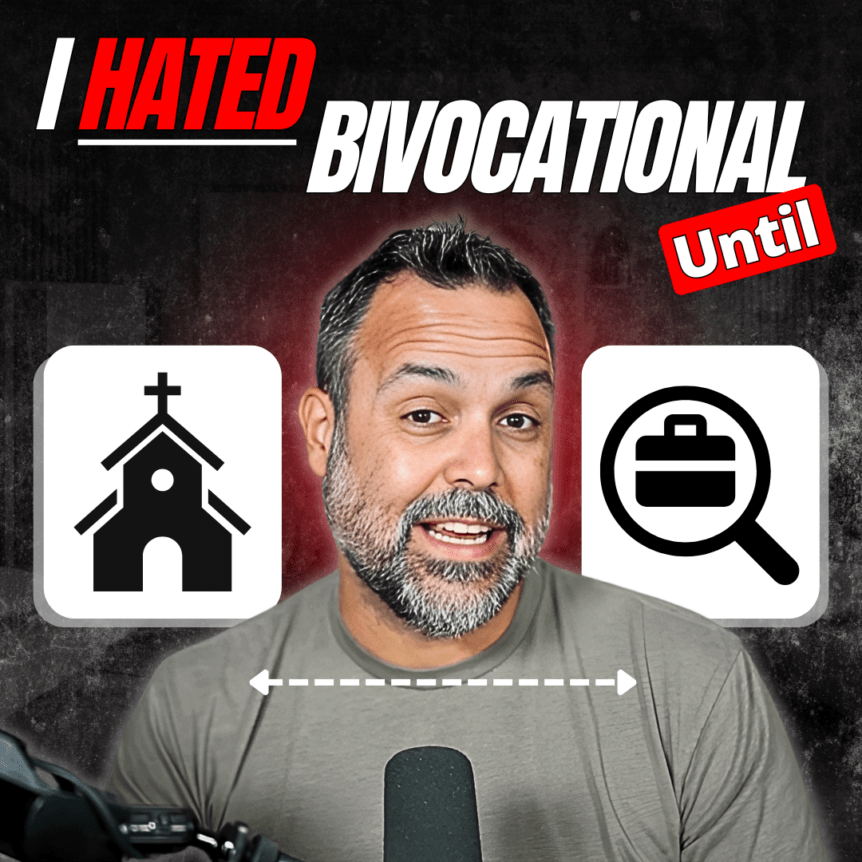Bivocational ministry means serving as a pastor while also working another job. Many churches can’t afford full-time pastors, and many ministers feel called to both church and career.
This path comes with both blessings and challenges. It provides financial stability and new ministry opportunities but also requires careful balance to avoid burnout. If you’re considering bivocational ministry, this guide will help you understand what it is, how to manage your time, and how to stay healthy in both work and faith.
Whether you’re just starting or already serving, this guide will give you the tools to thrive.
Let’s jump in.
Estimated reading time: 8 minutes
Table of contents
What is Bivocational Ministry?

Bi vocational ministry is when a pastor works a second job while also leading a church. Unlike full-time ministry, where a pastor is fully supported by the church, a bivocational pastor earns income from another job.
Many small churches, church plants, and rural congregations rely on bivocational pastors because they cannot afford a full-time salary.
Traditional vs. Bivocational Pastors
A traditional pastor works only in pastoral ministry, focusing entirely on preaching, teaching, and church ministry. In contrast, a bivocational pastor divides their time between their job and their church responsibilities.
This balance can be challenging, but it also allows pastors to stay connected with their communities in unique ways.
Different Models of Bivocational Ministry
Some pastors work part-time in a secular job, using their extra income to support their families while focusing on church ministry. Others work full-time outside the church, fitting pastoral ministry into evenings and weekends.
Some even start a business to provide flexibility while serving as a pastor. Each model has benefits and challenges, depending on the pastor’s calling and financial situation.
Biblical and Historical Examples
The Apostle Paul was a well-known example of a bivocational pastor. He made tents to support himself while planting churches and spreading the gospel (Acts 18:3). Many early church leaders followed a similar pattern, working to provide for their needs while serving in church ministry.
Even today, many church plants begin with a bi vocational pastor leading the congregation while working another job.
Bivocational ministry requires dedication, but it allows pastors to serve even when full-time ministry isn’t possible.
Is Bivocational Ministry Worth It?

Bivocational ministry is both rewarding and challenging. Many church planters and pastors take this path to serve in gospel ministry while supporting themselves financially. It allows local churches to grow without the burden of a full-time salary.
However, it also comes with unique struggles. Is it the right choice for you? Let’s look at the pros and cons.
Pros
Many bivocational ministers find great benefits in this approach, including:
- Financial Stability – You don’t have to rely entirely on church income.
- Little or No Cost to the Church – Small churches and church plants can have strong leadership without a full-time salary.
- Community Engagement – A secular job provides opportunities to build relationships and share the gospel outside the church.
- Stronger Connection with Church Members – Working a regular job helps pastors understand the daily struggles of their congregation.
- Flexibility in Ministry – Some jobs allow for a flexible schedule, making it easier to balance work and church responsibilities.
Cons
Despite the benefits, there are challenges that church planters and pastors must consider:
- Time Constraints – Balancing two roles can be exhausting.
- Limited Availability – Less time for counseling, discipleship, and church activities.
- Risk of Burnout – Juggling work, family, and gospel ministry can be overwhelming.
- Church Growth Challenges – Some church members may expect full-time availability.
- Job Conflicts – Work schedules may interfere with church responsibilities.
Bivocational ministry isn’t for everyone, but for many, it’s a powerful way to serve in the local church while staying financially secure.
Balancing Ministry and a Job

Balancing a job with pastoral ministry can be difficult, but many pastors successfully serve their churches while working outside jobs. Whether in a church plant or an established local church, bivocational pastors must learn to manage their time, finances, and energy wisely.
While this lifestyle can be exhausting, it also provides unique opportunities for ministry. By planning well and staying focused on Jesus Christ, pastors can serve both their workplaces and churches effectively.
Financial Considerations
One of the main reasons pastors choose bivocational ministry is financial stability. Many small churches cannot afford a full-time salary, and church planters often support themselves until the church grows. Here are key financial considerations:
- Budget Wisely – Keep a clear budget for personal and church expenses. Living within your means reduces stress.
- Save for the Future – Bivocational ministry can be unpredictable. Having savings provides security in case of job or church changes.
- Know Tax Implications – Pastors often have unique tax situations. Understanding how ministry income and secular income affect taxes is crucial.
- Consider Health and Retirement Benefits – Some churches cannot offer benefits, so a secular job may provide necessary health insurance and retirement plans.
By handling finances carefully, pastors can reduce stress and focus on gospel ministry without constant financial worry.
Avoiding Burnout
One of the biggest struggles for bivocational pastors is avoiding burnout. Balancing a job, church ministry, and personal life can feel overwhelming, especially when every responsibility demands attention.
To stay healthy, pastors must set clear boundaries between work, ministry, and family. It’s important to protect personal time and not allow responsibilities to consume every moment. Rest is also essential—just as Jesus Christ took time away from crowds to pray and recharge, pastors must make time for Sabbath rest and vacations.
Delegation is another key to longevity in ministry. Church members should be encouraged to take on leadership roles, allowing the pastor to focus on what is most important. A strong spiritual life also helps prevent burnout. Regular prayer, Bible study, and accountability provide strength and renewal.
Finally, pastors must listen to their bodies and emotions. When exhaustion sets in, it’s wise to take a step back, seek support, and make necessary adjustments. A sustainable ministry requires balance, and without proper care, burnout can harm both the pastor and the church.
Ministry in a Secular Field
A secular job isn’t just a way to make money—it’s also a powerful opportunity for ministry. Many bivocational pastors find that their workplaces provide unique chances for cross cultural evangelism. In a diverse work environment, they interact with people from different backgrounds, beliefs, and cultures.
By building relationships and demonstrating faith through their actions, they create opportunities to share Jesus Christ naturally in daily conversations.
Integrity and excellence in work also serve as a testimony to the gospel. A pastor who works hard, treats others with kindness, and handles challenges with grace can make a deep impact. Over time, coworkers may seek spiritual guidance or open up about their struggles.
Instead of seeing a secular job as a burden, bivocational pastors can embrace it as an extension of their calling. By bringing the love of Christ into their workplace, they fulfill their mission beyond the walls of the church.
When to go Full-Time into Ministry (or not)
Deciding when to transition from bivocational ministry to full-time ministry is a significant choice. Some pastors feel called to make the shift when their church has grown enough to provide financial support. Others sense God leading them into full-time ministry despite financial uncertainty.
Key factors to consider include the church’s stability, personal finances, and family needs. If ministry demands become overwhelming and the church can sustain a full-time pastor, it may be time to transition. However, some pastors remain bivocational by choice, seeing their secular work as an extension of their calling.
Full-time ministry isn’t the only path—what matters most is following God’s leading and serving faithfully, whether in a church or a workplace.
Full-Time or Part-Time?

Bivocational ministry is both challenging and rewarding. It requires careful balance, strong faith, and a willingness to serve in multiple roles. While the demands can be high, the opportunity to impact both the church and the workplace is invaluable.
Whether you remain bivocational or transition into full-time ministry, the key is to follow God’s leading and trust His plan. Financial wisdom, rest, and cross cultural evangelism in the workplace all contribute to a thriving ministry.
No matter the path, serving Jesus Christ with faithfulness and perseverance will bear fruit, both in your local church and in the lives you touch daily.
More Resources for Pastors





